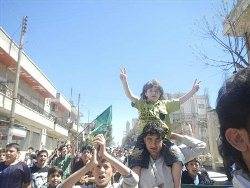Doubts surround Syria regime as peace deadline passes
12/04/2012| IslamWeb
A UN-backed deadline for an end to 13 months of bloodshed in Syria that has killed thousands passed Thursday amid doubts about the regime's compliance with the ceasefire terms.
After breaking a commitment to pull back forces from urban areas by Tuesday under an agreement brokered by Kofi Annan, a former UN chief serving as a peace envoy, the regime's latest promise to abide by the ceasefire lacked credibility, according to Washington.
Just hours before the deadline expired at 6:00 am (0300 GMT) Thursday, the regime's military unleashed a lethal offensive against urban areas, killing 25 civilians on Wednesday, including 10 in the opposition stronghold of Rastan, according to opposition sources.
That was the same day that Annan, serving as a peace envoy for the UN and the Arab League, said he received a letter from Syria that promised to "cease all military fighting throughout Syrian territory as of 6:00 am."
But the letter reserved the right "to respond proportionately to any attacks carried out by armed terrorist groups," a phrase used in the past by President Bashar al-Assad's government to describe opposition forces.
US President Barack Obama and German Chancellor Angela Merkel agreed in a telephone call that the UN Security Council, which gave its blessing to Annan's plan, needed to "take more resolute action" on Syria.
"The president and chancellor shared the concern that the Assad government was not complying with the terms of the agreement negotiated by Kofi Annan and continued to engage in unacceptable brutality against its own people," a White House statement said.
Susan Rice, the US envoy to the United Nations, said that Assad's regime has in fact intensified violence since it first committed to Annan's plan on April 1.
"Its commitments therefore have little, if any, credibility ... given that track record," Rice said.
In Washington, foreign ministers of the Group of Eight major industrial powers met on Syria and other global crises, with both Britain and France pressing for monitors to verify any eventual ceasefire.
French Foreign Minister Alain Juppe called for the UN Security Council to seek a "robust observers force" that would verify compliance and "could move freely" without interference from Assad's regime.
British Foreign Secretary William Hague warned that his government would boost support for Syria's opposition and seek further sanctions if Assad does not comply with the ceasefire.
"Our pressure on the regime -- its campaign of murder, torture and oppression -- must be intensified if Kofi Annan has not succeeded," Hague told reporters after the first day of the two-day talks.
Syria already failed to keep a Tuesday deadline to withdraw its troops and heavy guns from population centers.
The opposition Syrian National Council said both it and the opposition Free Syrian Army were committed to the truce but also voiced doubts about the regime's commitment.
"The Syrian people together with the international community will be watching carefully and monitoring the regime's deeds on the ground," said the Council's foreign relations chief Bassma Kodmani.
Annan was visiting Iran, Syria's main ally in the Middle East.
Russia has historically been the top supporter of Assad, and Secretary of State Hillary Clinton had said she would press Russian Foreign Minister Sergei Lavrov over Syria during the Group of Eight talks.
Moscow, which along with China vetoed two UN Security Council resolutions that would have tightened the screws on Assad, has championed the Annan peace plan but also sought pressure against the Syrian opposition.
Russian Deputy Defense Minister Gennady Gatilov, writing on Twitter, said that after the Syrian government's statement of support for a ceasefire "now it is the armed opposition's turn -- those are the conditions of Annan's plan."
For his part, Iranian President Mahmoud Ahmadinejad said of Syria that "all violence in the country should be halted."
"The implementation of any plan and strategy in Syria should be done without pressure and interference of others," Ahmadinejad said.
Annan is to brief the UN Security Council by video link from Geneva on Thursday, in what diplomats said would be key to the world body's next steps.
Western governments argue that a ceasefire alone is not enough and that the Damascus regime must withdraw its troops from towns and cities.
"Just ending the attacks will not be enough to be in compliance," one Western diplomat told AFP.
"It would be totally inadequate if they don't withdraw from population centers but keep troops and heavy artillery in place."
PHOTO CAPTION
Demonstrators protest against Syria's President Bashar Al-Assad in Kafranbel, near Idlib April 10, 2012.
AFP

